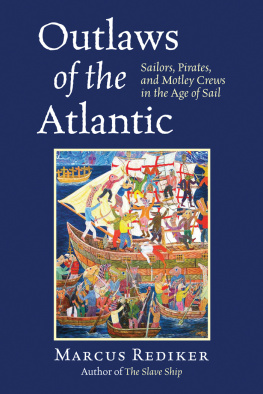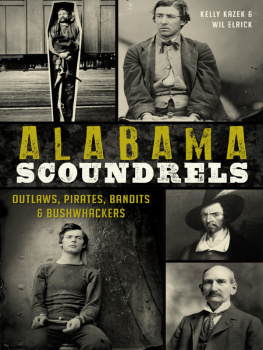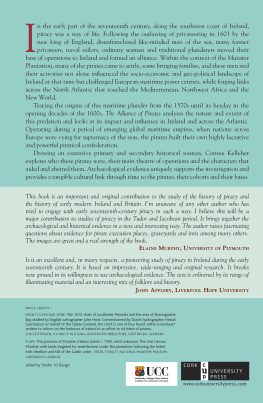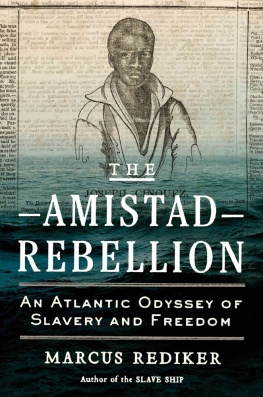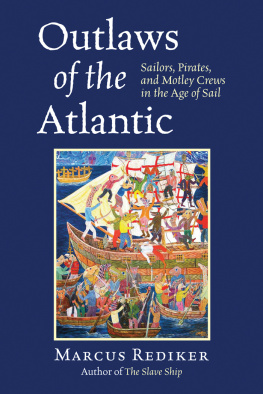Also by Marcus Rediker
The Amistad Rebellion: An Atlantic Odyssey of Slavery and Freedom
The Slave Ship: A Human History
Villains of All Nations: Atlantic Pirates in the Golden Age
The Many-Headed Hydra: Sailors, Slaves, Commoners, and the Hidden History of the Revolutionary Atlantic
(with Peter Linebaugh)
Between the Devil and the Deep Blue Sea: Merchant Seamen, Pirates, and the Anglo-American Maritime World, 17001750
Outlaws of the Atlantic
Sailors, Pirates, and Motley Crews in the Age of Sail

MARCUS REDIKER
Beacon Press, Boston

To Staughton Lynd, Jesse Lemisch, and Gary Nash
and to the memory of
Alfred F. Young and Edward Thompson
my teachers in history from below

Contents
Preface
I begin this book about Atlantic outlaws with a story about my late mother, Lucille Fadell Robertson, who was born in a little town called Dunmor in the utterly landlocked state of Kentucky. As far as I could tell as a child, Dunmor was made up entirely of poor people. My mothers father, my grandfather, was a coal miner. Her mother died when she was two years old, no uncommon thing among people of her class. Like many poor rural people, my mother had a dense network of kin, including double first cousins. One of them was a factory worker of artistic bent. Over the years he sent us an endless series of sentimental paintings. One day my mother pointed proudly to a recent arrival and proclaimed, Its a painting of the bank in Russellville, Kentucky.
Its what? I was puzzled. Why would anyone want to paint the bank of Russellville, Kentucky? I asked innocently. Ooooh, came the retort, Mr. Hotshot Professional Historian doesnt know the historical significance of the bank of Russellville, Kentucky. I hung my head. No, Mother, I dont. Tell me. She smiled as she answered with a history lesson: The Russellville bank was the first bank the James boys robbed.
She referred, of course, to Jesse and Frank James, the notorious James boys, who robbed banks all over the Upper South and Midwest and became two of the greatest outlaws in all of American history. My embarrassment faded as I sensed an opportunity. I asked, What did all of the people around Dunmor think of the James boys? She paused a second, pensively, and answered in her lilting Southern Kentucky accent: Theys good boys. Jus got in a lil trouble, is all.
A little trouble? They committed dozens of bank and train robberies and many murders. Local, state, and federal authorities engaged them in an all-out manhunt, which resulted in torrid shoot-outs and more deaths. Jesse himself was eventually killed in 1882 by a bounty hunter, who later committed suicide in trembling fear that Frank James would track him down and kill him. By the standards of small, quiet Dunmor (current population 317), this seemed to me to be something rather more than a little trouble. I was amused, and not a little excited, to discover these outlaws kicking around in our family history. I ventured another question: The people around Dunmor didnt care that the James boys robbed the bank in Russellville? My mother did not need to pause and think this one over. She replied sharply: People in Dunmor didnt have any money in that bank. They were too poor.
Thanks to my cousins painting, I learned that the people of Dunmor, including my mother, did not consider the James boys to be criminals or even bad people. They were good boys who just got into a little trouble. Thats all. They were outlaws who commanded some degree of popular support and even pride in what they had done. Or to put the point a different way, the law does not a criminal make. The James boys were classic social bandits as described by historian Eric Hobsbawm.

I have been writing about outlaws my entire career as a historian, so it is a special pleasure to gather my thoughts and writings on the subject and to present this volume, Outlaws of the Atlantic. I first wrote about sailors, mutineers, and pirates, the quintessential outlaws, in Between the Devil and the Deep Blue Sea (1987) and followed up on the topic on a
This book explores the sea as a setting for human activity and historical change against the backdrop of the Atlantic and global rise of capitalism. The Prologue sets the scene of the Atlantic in the age of sail. site of rebellion. This theme continues in the final chapter, where the makers of the Amistad rebellion (1839) used the sea as a setting of struggle while others saw their rising through the lens of a pirate story, which shaped the outcome of the historic case. The book ends with thoughts about the outlaw Atlantic, showing how sailors, slaves, pirates, and motley crews shaped a history we have long regarded as white, elite, national, and landed. These cosmopolitan workers of the world have much to say to us in a new era of globalization.
Prologue
The European deep-sea sailing shipand the seamen who made it gotransformed the world. On the Santa Maria, on which Columbus crossed the Atlantic, on the Victoria, on which Magellan circled the globe, and on the ever-growing fleets of merchant and naval vessels that linked the seven seas, their continents, and their peoples, the motley crews who worked aboard the most sophisticated machines of their day made history. By moving commodities such as silver, spices, and sugar over long distances they built the world market and the international economy. By carrying traders, settlers, and empire builders to Africa, Asia, and the Americas, they changed the global political order. Deep-sea sailors thus made possible a profound transformation: the rise of colonialism, capitalism, and our own vexed modernity.
Yet sailors have never gotten their due in the history books. Bertolt Brecht asked, Who built the seven gates of Thebes? He answered, The books are filled with the names of kings, but then he wondered, Was it kings who hauled the craggy blocks of stone? Explorers like Columbus and Magellan, and admirals like Horatio Nelson, have long dominated our view of the history of the sea, but that at last has begun to change. Histories of great men and national glory by sea have, over the past generation, been challenged by chronicles
Within the more recent rise of transnational and world history the sailor has begun to move from the marginshis customary position in national historiesto a more central position as one whose labors not only connected, but made possible, a new world. It is increasingly obvious that crucial historical processes unfolded at sea and that seafaring people were history makers of the first importance. This collection of my work over the past thirty years focuses on both transformations, bringing together the Atlantic and global histories of seafaring and slavery, the rise of capitalism and the many challenges to it from belowoften literally, from below decks.
In writing maritime history from below, I have encountered not only the elitism of the old maritime history but an obstacle more subtle and less understood: the uninspected assumption that only the landed spaces on the earths surface are real. Perhaps it is not quite right to call this assumption a matter of thought; it is more an instinct, a mental reflex, and perhaps all the more powerful and pervasive for being unconsidered. One suspects that it is a matter of mentalit, a deep structure of Western thought that has an ancient history. Yet it must also be noted that this way of looking at the worldI call it

